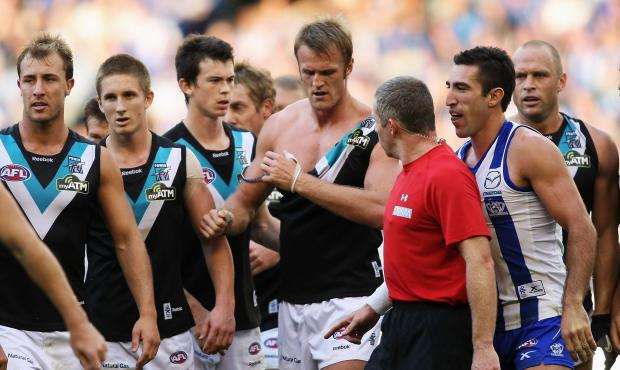But Justin Schmitt, who will achieve the milestone this Sunday when he picks up his whistle to officiate Hawthorn's clash with Gold Coast, is still going strong.
Schmitt describes the world of umpiring as a "tough environment", but one he dearly loves.
"There's a lot of scrutiny on everything you do," Schmitt told AFL.com.au this week.
"We're miked up, and everything we say and do is analysed.
"Obviously it's good for us, because it helps us get better, but it can be confronting as well."
With more cameras at every game, around-the-clock coverage and social media, mistakes are now magnified more than ever before.
"It's the biggest game in the country, with lots of people covering it and a lot of people interested," Schmitt said.
"The scrutiny on umpiring forms a part of that, more so than ever."
A lawyer by day, Schmitt squeezes his umpiring around work and family (he has twin seven-year-old sons and a five-year-old daughter).
For 16 seasons – the first four based in Adelaide, before a 2001 move to Melbourne – he has trained almost every day to maintain the condition required to umpire at the elite level.
There have been setbacks, too.
Schmitt missed the entire 2007 season with a bad back, and most of 2010 after he injured his shoulder in bizarre fashion: while swimming, he hooked arms with another swimmer.
"I went to see a physio and he said I'd just strained a bicep tendon a little bit, and it would be all right in a couple of weeks," he said.
"But I really struggled bouncing for the rest of that season, and it got to the end of the season and it wasn't any better, so I went and had scans, and they said I'd need a full reconstruction."

If injuries have been one challenge, the game itself has continued to offer others.
Changes in the way Australian football is played have made umpiring more difficult.
"It's definitely harder than when I first started," Schmitt said.
"The numbers around the ball now are more than I can ever remember, and that leads to more and more contests, so you're making more and more decisions.
"Every time there's a tackle, you ask yourself two or three questions.
"Tackle counts have gone through the roof from when I started to where they are now."
Rule changes are another obstacle.
This year's introduction of the 'forceful contact below the knees' rule, banning players from sliding into opponents at contests as they try to win the ball, has required what Schmitt described as a "re-calibration" in thinking.
Although the rule has been a major talking point at times, Schmitt believes the umpires have transitioned well.
"Like anything new, all of us have had to think a bit differently about that type of contest," he said.
"What was perceived before as players going hard for the ball, you now have to take that step back and think about it differently: 'How have they got there? Have they made illegal contact?'
"That's always going to take a little bit of time, but I think in general we haven't gone too badly with it."
But the veteran whistle-blower - the fifth-most experienced on the AFL's 2013 list - baulked at the prospect of a rule banning 'shrugging'.
The tactic has caused controversy, most recently when Adam Selwood received a game-defining free kick for high contact in the dying stages of last Friday night's clash between West Coast and North Melbourne.
"The clear direction that we've got at the moment is to protect the ball player, and if it's a high tackle, then pay it," Schmitt said.
"Obviously we're conscious of people leading with the head or the true ducking, but if we see someone tackled high standing up, we pay it as a high tackle.
"How you'd see if someone's shrugged would be very difficult, I would have thought."
For a man who started umpiring simply looking to earn some pocket money during his first year of university in Adelaide, the caper has taken him a long way.
And he has no plans to hang up the whistle just yet.
"At the moment I'm still enjoying it, so as long as the old legs can still get me around, I'll keep going," he said.


